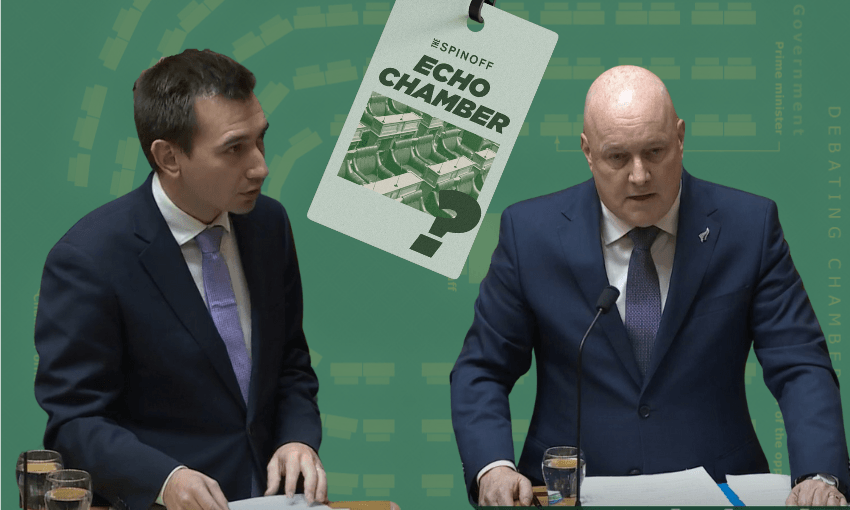Healthcare dominated the debate in an unusually sober and serious question time.
Echo Chamber is The Spinoff’s dispatch from the press gallery, recapping sessions in the House.
“Hey David!” a group of high school students in the public gallery called out as Act leader David Seymour entered the debating chamber. Standing in the middle of the floor, before any other MPs had arrived, he happily chit-chatted back: “I hope you guys really enjoy this and I hope that afterwards you believe in democracy at least as much as before.”
Whether they enjoyed it is doubtful. Whether they believed in democracy more than before is possible. Despite a week where culture wars and the word “bussy” dominated headlines, Wednesday’s question time was unusually sober and serious. The opposition’s heckling was less energetic, the government’s what-about-isms were subdued, and prime minister Chris Luxon was uncharacteristically detail-focused.
Healthcare dominated the debate, particularly two recent new stories: a 1 News report where several senior doctors at Nelson Hospital claimed patients’ lives were being put at risk due to wait times and a survey in New Zealand Doctor which found that many primary care doctors are feeling more pessimistic than ever under new health minister Simeon Brown.
As Chris Hipkins questioned how the government let the situation get this bad, Luxon maintained a low tone, acknowledging “some real long-standing challenges” and promising a rapid response team would “actually work out how they can work through the issues that they’re experiencing”. Luxon strongly denied Hipkins’ claim that the government had put a hiring freeze on doctors and nurses. “There is more money, there are more staff, and there is no hiring freeze,” he insisted.
Luxon had anticipated the topic of questioning and rattled off a list of things his government was doing – expediting 100 GPs and 400 nurses, an additional $285 million into the GP system, and a $17 billion increase in total healthcare spending.
In the seat next to him, health minister Simeon Brown sat forward attentively with his hands in his lap – a notable departure from his typical lean-back-and-manspread posture. Along with Luxon’s contrite tone, it was a signal that this issue had struck a rare nerve.
Like Luxon, Brown read from a prepared list of actions he was taking: sending a rapid response team to Nelson to assess the situation, bringing surgeons in from Blenheim, and getting teams in from other parts of the country to help get through first specialist assessment waitlists.
Luxon and Brown love the game of politics. They’re more comfortable on attack than defence. They were both highly effective in opposition, and in government, their first instinct is to flip every issue into a criticism of the last lot. They tried this strategy on Wednesday, but the blows didn’t have their usual force.
“The last administration was actually just reorganising decks on the boat and not caring and delivering outcomes for New Zealanders,” Luxon said. Later, during an exchange with Labour’s health spokesperson Ayesha Verrall, Brown took a similar line: “If the member looked at the track record of her government, she would realise that this is a problem which has grown over time.”
It’s fair to argue that many of the government’s problems were inherited, but this particular scandal is harder to hand-wave away. It’s true that wait times increased significantly under the previous Labour government – it’s a large part of the reason the National-led coalition won the election – but the doctors in Nelson were clear that this isn’t a mere continuation from 2023; the problem is the worst it has ever been.
The politics of blame don’t work quite as well in healthcare. It’s all well and good to finger-point about the cost of ferries or the state of the broader economy, but the public doesn’t have much tolerance for that carry-on when lives are at risk right now.
To their credit, Luxon and Brown came prepared and treated the issue with the seriousness it deserved. Labour didn’t land a knockout blow but will be more than happy to keep highlighting any failures in the health system. There’s a reason the job of health minister is considered the cabinet’s biggest hospital pass (pun intended). You get little credit when things are working well and shoulder all the blame as soon as things go wrong.
Luxon’s decision to swap out the underperforming Shane Reti for close friend and ally Simeon Brown was seen as a move to shake up the system with the same cut-throat approach that Brown applied to transport. It may still prove to be an effective tactic at a management level. In the house, though, it comes with a major downside. Brown is the government’s most forceful attack dog, so when the opposition bogs him down with complex and sensitive health scandals, they neutralise his bark and his bite.





